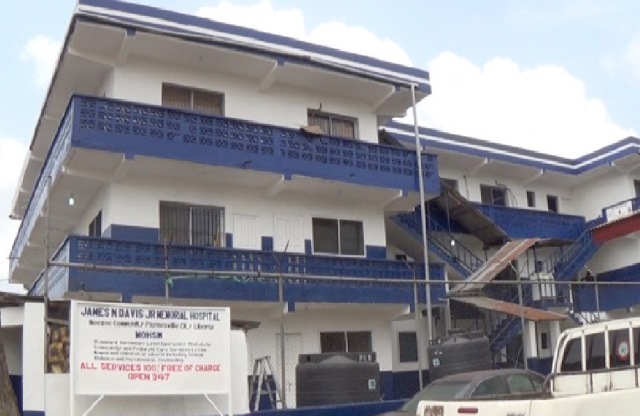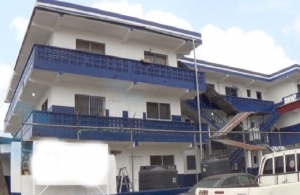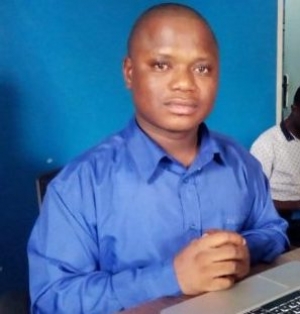Displaying items by tag: Budget
‘Death Trap’?: The Awful Story of a Liberian Hospital
By: Gloria Wleh
The James N. Davis Jr. Memorial Hospital (JDJ) was once operated by a medical humanitarian organization, Medicine Sans Frontieres (MSF), catering to the medical emergency needs of women and children. Their intervention helped improve access to healthcare for many Liberians. But like all good stories, the MSF-JDJ story came to an end on April 2, 2010 with the turning over of the facility to the Government of Liberia. The hospital has been run by Government ever since but things have not remained the same. In fact, they have gotten worse.

The James N. Davis, Jr. Memorial Hospital in Neezoe. PhotoCredit: GNN Liberia
Ma Korpo Lake is elderly and lives in Totota, Bong County. She sells in the market to get her daily bread. In July, she made a trip to Monrovia to cater to Sonnie Morris—her 25-year old daughter on the verge of bringing forth a child. When Sonnie was grabbed by the pangs of labor, Ma Korpo took her to the St. Benedict Mini Health Center in the Pipeline community, Paynesville. But after three days in labor, the facility referred her to the James N. Davis Jr., Memorial Hospital (JDJ) in Neezoe Community, for surgical operation. She was informed that her daughter was unable to bring forth the baby because the baby was breech.
An anxious Ma Korpo departed for the JDJ in anticipation of a miracle that would save the lives of her daughter and the unborn child. But once at JDJ, things became gloomier. In addition to the cost of the surgery, the public hospital requested Ma Korpo to purchase fuel for the running of the generator before her daughter is extended medical care. “Because they [St. Benedict Mini] were unable to do the work on my daughter, she was transferred to this hospital (JDJ). But as we arrived with her here, they [JDJ] told us to pay three thousand two hundred and forty Liberian dollars for six gallons of fuel, along with ten thousand and eighty-five Liberian dollars for the operation set, before they (JDJ) could touch my daughter." “And I am a market woman from Totota, Bong county; my daughter’s fiancé is a security man who is not employed but serves as a contract-security-guard for stores in Monrovia here; we don’t have the money to pay for all of the medical bill, but they (JDJ) told us that if we cannot buy the items they want, they were not going to cater to my daughter who needed urgent medical attention,” the down-hearted Ma Korpo lamented.
Ma Korpo, who looked scared and worried, furthered that while she was terrified and perplexed about her daughter’s life and that of the unborn hanging in the balance, the hospital kept demanding them to pay for those items before her daughter could be treated.
“We later bought the fuel, but because we didn’t have enough money, we begged the hospital and paid LD$4,700 of the operation set payment, before they attended to my daughter,” she furthered.
“Sonnie’s wound has to be dressed two times daily. We need to buy drugs that cost LD$4,840; including the needles and gloves that are to be used to dress her wound for the next days she is to be receiving treatments; we have gone dry of money to even buy her the first cup of tea that she is supposed to drink every morning and evening; I don’t have anywhere to turn to for help right now”, Ma Korpoe said in a sad tone.
But Ma Korpo is not alone. Like her, Joseph Doe (not his real name) took his pregnant wife to the JDJ for surgical operation, and was also told by the hospital to buy fuel for the hospital’s generator before she could receive any medical attention.
Joseph, who preferred being anonymous, said he had earlier on taken his wife to the Benson Hospital in Paynesville, but was later told by the hospital (Benson ) that his wife needed operation in order to bring forth their child, and that they (Benson Hospital) were unable to carry on such an operation.
“My wife couldn’t give birth all by herself that night, and so she was transferred from Benson Hospital to James N Davis Jr. Hospital for surgical operation, but upon reaching at the hospital, I was firstly told by the hospital to buy six gallons of fuel for their generator, before my wife’s emergency condition could be catered to.”
“I was shocked but with the great fear that was in me of not wanting to lose my wife, I hurriedly paid for the fuel and additional ten thousand plus Liberian dollars for the surgical materials set, which were also required to be paid for in order for her to be treated.”
“I am till this date confused as to whether James Davis Hospital is a government owned facility, or a private institution. Because even at the private facility where my wife was, there were some services and medical material that were freely given to her,” he added.
“I paid for every single thing at that hospital, including the needle and gloves that were used on my wife. That place being an emergency treatment center for women and children seems to be a death trap for low income earners who might go there with the thought of it being a government facility that should have affordable services,” he stressed.
The current situation at the James N. Davis Jr., Memorial Hospital in Neezoe, doesn’t seem to be a new issue there, as a Liberian journalist also explained his scenario when his wife was taken there, four years back.
According to Necus Andrews who reports for The News Newspaper, his wife was taken to the JDJ Hospital for Caesarean section (C-section), and he was told by the hospital, to buy six gallons of fuel for the hospital’s generator, before she could be attended to.
“When my wife was taken to the James N. Davis hospital in Neezoe, they told me to buy six gallons of fuel for the hospital’s generator before my wife could be catered to. Adding that the hospital was financially challenged, and that it was a tradition for patients who go there to be treated,” Journalist Andrews said.
“I was scared of losing my wife, my child, or both of them; so as confused as any other person could be during such a time, I paid for the fuel and other items as asked for, but for someone who might not have to pay, it might turn out to be a death trap for them,” he noted.
“The purchasing of fuel before treatment at that hospital is a serious trauma-game that is played out on patients who go there for emergency treatments, and it poses a very serious psychological threat to a patient’s life. And even though that place claims to provide a health service, I can safely say that that place is a death trap,” he maintained.
”National government needs to pay a very serious attention to the James N. Davis Hospital, by providing the basic materials for the smooth operations of the hospital. Their failure to do so would cause people who do not have the finances to go to this emergency facility for instant service, to lose their lives, or stop them from going there for treatment,” journalist Andrews stated.
When contacted, the head of the James N. Davis Jr., Memorial Hospital in Neezoe, said, “his institution is receiving funding from the government of Liberia, but it is not enough to cover all of the medical needs of the health center which caters to over fifty patients daily."
According to Director General Anthony Quayee, “requesting each patient who goes to the hospital for surgical treatment to buy fuel for the hospital’s generator is the only means by which the hospital is able to cater to the needs of its patients, without its generator having breakdown."
The JDJ boss who also refused to be recorded added that the government has been unable to make available funding to the hospital in full and on time for its operations. Though the JDJ boss was tightlipped on funding received, and when it began receiving funding from the government of Liberia, our investigation shows that the JDJ and the Bensonville Hospital jointly received US$55,457.00 in fiscal year 2019/20. The funds received by these two hospitals amounts to only 55% of funding government provided to Senator Jeremiah Koung’s private hospital (the Esther & Jereline Medical Center in Ganta, Nimba) that year. Meanwhile, the Government has budgeted a meager US$100,000.00 for the two hospitals in the 2020/21 budget year.
When contacted on Thursday, July 22, 2021, the Minister of Health promised to do some assessments at the James N. Davis Hospital before speaking to the situation. But upon being called back on the 27th of July 2021, as requested, there was no feedback provided by her , as she was yet to carry out the assessment as promised. Other efforts to get the Minister’s comment proved futile.
While we await words from the Minister of Health, we can only say that the nightmarish experiences of Ma Korpo and the likes are only a gist of what thousands, if not millions, of Liberians go through while seeking medical care. As many citizens visiting public health facilities complain of squeezing water out of rocks to shoulder said costs, we cannot stop but wonder how the nation treats its own. And for those who unfortunately do not meet up with said expenses, we only grind our teeth hoping that not so many have lost their lives in such situations. Until the Health Minister gets back, we continue to ask: Are public hospitals really death traps?
About the Author
Gloria Wleh is a CENTAL Investigative Journalism Fellow and reporter for The Stage Media (TSM).
Editor: This article was edited by Gerald D. Yeakula, Esq., Program Manager at the Center for Transparency and Accountability in Liberia (CENTAL).
Editor’s Note: This article is made possible through the National Integrity Building and Anti-Corruption (NIBA) program implemented by CENTAL with funding from the Swedish International Development Cooperation Agency (SIDA) through the Embassy of Sweden.
Online Learning Can Be a Reality with Increased Budgetary Support to Education, COTAE Says
The Coalition for Transparency and Accountability in Education (COTAE) is deeply concerned about the fate of the Education Sector, especially the inadequacy of resources that continues to undermine the quality, adequacy and accessibility, and gender sensitivity of educational services in Liberia. As you may be aware, Education is a fundamental human right, guaranteed by Article 6 of the 1986 Liberian Constitution, Sustainable Development Goal 4, the Abidjan Principles and other global, regional and national frameworks and policies. Such right cannot be downplayed by any nation, especially impoverished country like Liberia in urgent need of the required human capital to develop, fully implement and sustain its transformative agenda.
We wish to thank the Government of Liberia for steady progress towards increasing national budgetary support to education. Over the last two budget years, the allocation for education has increased, especially by 1 percent from 13.7 percent in fiscal year 2017/2018 to 14.7 percent in 2018/2019, as well as another percentage increment for fiscal year 2019/2020 representing 15.8%. Thanks to concerted efforts by the More 4 Education Campaign[1], funded by USAID through the Liberia Accountability and Voice Initiative; the Ministry of Education; Legislature, and other critical partners and stakeholders that made this possible.
Nevertheless, there’s not much to celebrate as Government’s support to education in Liberia lags far behind regional counterparts. A research conducted by COTAE in 2018 discovered that Sierra Leone allocated 27% to education, while Ghana and Senegal appropriated 35% of their budgets to education respectively. Besides, the actual education budget for fiscal year 2019/20 suffered an 8% decrease from US$570.14 million in FY 2018/19 to US$525.91 million in FY 2019/20. In other words, the percentage increment for education to 15.8% amounts to US$83.4 million, a US$1.9 million decline when compared to the US$85.3 million allocation for FY 2018/2019.
All of these are happening when the education sector is faced with numerous challenges due to low financing. The challenges have even been exacerbated by COVID-19, which has left schools closed for a protracted period and needing repair, fumigation, and other efforts to secure them for learning upon resumption of full academic activities. These add to existing challenges, including but not limited to lack of adequate learning facilities and supplies; shortage of trained and motivated teachers; lack of gender sensitive and responsive services; and limited opportunities to enroll and retain girls and persons with special needs in school.
Transforming education in Liberia, in part through addressing corruption and waste, decentralizing decision making and empowering local level structures; and addressing the plights of teachers, students and other educational workers requires timely, collective and well-coordinated efforts. The COVID-19 outbreak has heightened the need for keen attention to the education sector, given its critical role in keeping students and teachers engaged in academic and other productive activities, especially during emergencies. With the increasing gravitation towards online education, which has become apparent due to social distancing, restriction on movement, and other relevant health protocols announced by the government, the Ministry of Education needs to devise appropriate means to keep all students engaged. While the teaching by Radio Program introduced by the Ministry and partners somehow helped to keep students engaged, the quality and coverage left more to be desired. Among other things, the program was limited in scope and coverage, as remote areas were not adequately covered. This means that students without radio and those in rural areas still do not have access to education during this period, which is gross violation of their rights to education.
As the 2020/2021 national budget is being developed, we reiterate call for the Government of Liberia, especially the Executive and Legislature to honor their obligations to increase budgetary support to education to at least 20%. This will not only meet the minimum 20% benchmark/commitment required by the Global Partnership for Education, Incheon Declaration of 2015 and other global frameworks, but enable MOE, the National Commission on Higher Education and other key players to address enormous existing challenges, which have been compounded by the emergence of COVID-19. There is no better time to substantially invest in education than now when COVID-19 has exposed the weaknesses of the system, especially its inability to continue with academic and other productive activities during emergency.
Government must honor its commitment to satisfactorily fund and fulfil the right to education of its citizens, in line with Article 6 of the 1986 Liberian Constitution, Pillar One (Power to the People) of the Pro-Poor Agenda for Prosperity and Development (PAPD), and adopted international instruments such as the UN Convention on the Right of the Child (UNCRC), Incheon Declaration of 2015, Dakar Framework of 2000, Sustainable Development Goal 4, and Abidjan Principles of 2019.
Thank you.
Signed: Management
0886818855
[1] The More 4 Education Coalition is funded by USAID LAVI and is comprised of the Coalition for Transparency and Accountability in Education (COTAE), Youth Coalition for Education in Liberia (YOCEL), National Teachers Association of Liberia (NTAL), Inclusive Development Initiative (IDI), National PTA Network of Liberia (NAPTANOL), Helping Our People Excel (HOPE) and Youth Movement for Collective Action (UMovement).
LOCATION
22nd Street, Sinkor
Tubman Boulevard
Monrovia, Liberia
Phone: +231 88 681 8855
Email: info@cental.org.lr
Website: www.cental.org.lr
SUBSCRIBE
Get updates and important events straight to your inbox. We don't spam


